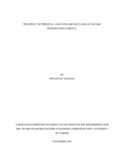| dc.description.abstract | The objective of this study was to investigate the effect of taxes on distribution of income in
Kenya. The population of the study consisted of all households in Kenya. A total of 13,158 were
considered in the study in line with Kenya Integrated Household Budget Survey (KIHBS) data
2005/2006. The KIHBS data are a stratified random sample consisting randomly selected
clusters across all districts in Kenya and comprising 8,475 rural and 4,683 urban households
resulting in a total sample size of 13,158 households. The records consist of data on household
expenditures.
Secondary data collected was analyzed using descriptive statistics particularly the sum, mean,
median, standard deviation range, correlations, and linear regression analysis. This was achieved
through the use of MS Excel and statistical packages for social scientist (SPSS) to generate
frequency distributions and percentages to assist the researcher in answering the research
questions. The output was presented in form of tables and figures
The key results indicate that although 64.4% of the sampled population was rural households,
64.4% of gross household income belonged to urban households, and whereas the urban
households paid more taxes in total for both PAYE and VAT, rural household paid more excise
tax than urban households. Distribution of income was highly skewed with the upper deciles
having over 51.5% of total gross income while the lower decile only had 1.1% of total gross
household income. The overall redistributive effect of taxes was 8.7% with PAYE contributing
the highest redistributive effect of 8%.
Households in rural areas generally paid less in taxes compared to their urban counterparts
except for excise tax where they paid slightly more. Further, households in the upper quartile
paid a higher proportion of their income as taxes compared to households in the lower decile.
The researcher concludes that taxes aid in redistributing income, with income taxes being the
most effective in achieving this objective, while the redistributive effect of consumption taxes
being very minimal and negative. | en_US |

